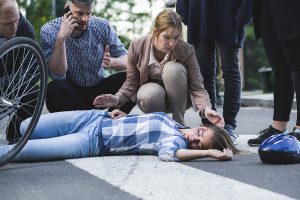What Is Said At An Accident Matters In Court
 Michael Babboni
Personal Injury
If you get into an accident and someone else is at fault but decides to not take responsibility for his, her or their actions, then this is usually the time to go to court. You should find yourself someone experienced in these matters, such as a St. Petersburg car accident attorney, to guide you through the process of a personal injury lawsuit, and get the financial compensation you deserve.
Michael Babboni
Personal Injury
If you get into an accident and someone else is at fault but decides to not take responsibility for his, her or their actions, then this is usually the time to go to court. You should find yourself someone experienced in these matters, such as a St. Petersburg car accident attorney, to guide you through the process of a personal injury lawsuit, and get the financial compensation you deserve.One of the most important things that contribute to the success of a personal injury lawsuit is evidence. As with a criminal trial, a civil suit requires a jury that needs to have the facts and arguments explained for them so they can deliberate and eventually arrive at a verdict. Evidence of all kinds is important in adding weight to an argument. One of the most important types of evidence are statements from the people involved, whether these are statements they recall making, statements heard by witnesses, or even statements that are caught on camera or some other recording device.
In a trial, these statements are known as “res gestae,” and they can sometimes be critical in proving a case.
Hearsay vs Admissible Evidence
In a court of law, many types of verbal statements are not taken seriously by the court. This is known as “hearsay,” and it simply means that what has been heard is not reliable and thus not admissible as evidence the jury can use. Good examples of this are if a witness is asked about a person’s activities and replies with, “I didn’t see anything myself, but someone told me about it.” Because this is second, or even third hand information, and the actual source of the statement is not available, it is hearsay.
Res gestae on the other hand, are statements that must be taken seriously because of the context of the situation. In an accident, for example, people are usually in a state of trauma, and so are not in a position to come up with an elaborate plan and deception. Usually what they say in the heat of the moment is what they genuinely think and feel.
First Impressions Count
It’s not unusual at all for people to come out of their cars, still shocked, and make statements like “I’m all right,” or “I’m okay,” and ask about other drivers and passengers. These res gestae statements, especially if recorded, can be important in court if other people later claim that they had injuries such as whiplash which can be difficult for medical instruments to detect and document.
It’s also very easy for someone to simply blurt the truth of “I’m sorry, I didn’t see you,” or “I took that corner too fast and didn’t check,” whereas in the hours and days after an accident, with the advice of friends, they may instead insist that you were at fault and collided into them as a result of your driving negligence. Always make sure to bring up these statements if you have them, to a good personal injury attorney for more legal guidance and support.
